外研版初中英语知识点汇总(供参考)
最新外研版英语八年级上册知识点总结(精华版)
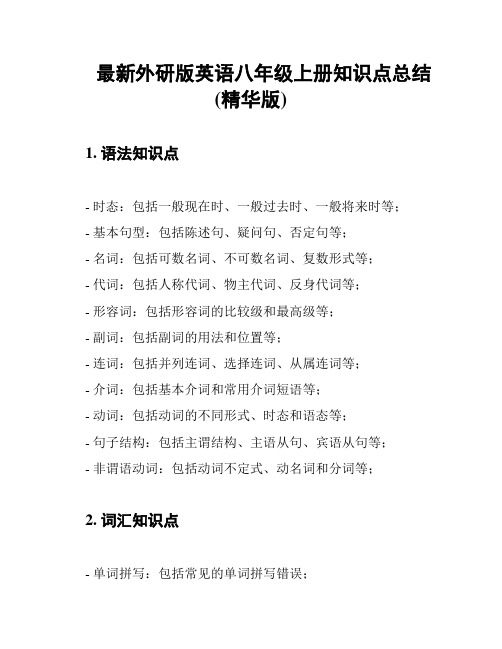
最新外研版英语八年级上册知识点总结
(精华版)
1. 语法知识点
- 时态:包括一般现在时、一般过去时、一般将来时等;
- 基本句型:包括陈述句、疑问句、否定句等;
- 名词:包括可数名词、不可数名词、复数形式等;
- 代词:包括人称代词、物主代词、反身代词等;
- 形容词:包括形容词的比较级和最高级等;
- 副词:包括副词的用法和位置等;
- 连词:包括并列连词、选择连词、从属连词等;
- 介词:包括基本介词和常用介词短语等;
- 动词:包括动词的不同形式、时态和语态等;
- 句子结构:包括主谓结构、主语从句、宾语从句等;
- 非谓语动词:包括动词不定式、动名词和分词等;
2. 词汇知识点
- 单词拼写:包括常见的单词拼写错误;
- 同义词:包括一些常见的同义词辨析;
- 常用短语:包括日常交际中常用的短语;
- 常用惯用语:包括一些惯用语的正确使用;
3. 阅读技巧
- 阅读理解:包括快速阅读和细节理解;
- 阅读速度:包括提高阅读速度和理解能力的方法;
- 阅读技巧:包括推测词义、寻找关键词等技巧;
4. 写作技巧
- 书信写作:包括格式、语言表达和常用句型等;
- 日记写作:包括表达个人感受和经历的方法;
- 作文写作:包括如何组织思路和提高写作水平的方法;
以上是最新外研版英语八年级上册的知识点总结,希望对你的研究有所帮助。
外研版初中英语知识点归纳

Module 1 重点词组1. “欢迎回到某地”welcome back to +地点名词如:欢迎回到学校welcome back to school热烈欢迎某人:give sb a warm welcome不用谢:You are welcome2. 首先:first of all (放句首)3.失物招领:lost and found失物招领箱:lost and found box在失物招领箱中:in the lost and found box4. 某人有某物:have(got)/has(got)= have/has某处有某物:there be(is/are)There be 的be动词的单复数根据“就近原则”变化(be动词与离它最近的主语在数上保持一致如:(1)桌子上有一支钢笔和一些书There is a pen and some books on the desk. (这里要用is,因为靠近它的名词a pen,是单数)(2)桌子上有一些书和一支钢笔There are some books and a pen on the desk,.(这里用are,因为靠近它的名词是some books,是复数) 5.谁的:?这是Lucy6. 在这儿/如果主语是名词要用全部倒装(谓语动词放在主语之前),如果主语是代词用部分倒装如:这儿有一封信。
Here is a letter.(letter是名词,要全部倒装,letter要放在谓语动词is后)它在这儿。
Here it is.(it是代词,要部分倒装,it放is前面)7.照顾:take care of = look after小心(照顾、做、处理):be careful with+名词小心做某事:be careful to do sth如:小心鸡蛋:Be careful with the eggs.小心地把鸡蛋拿到厨房:Be careful to take the eggs to the kitchen.8.从现在开始:from now on9.男士钱包:wallet 女士钱包:purse10.与。
外研版七年级上册英语全册知识点归纳
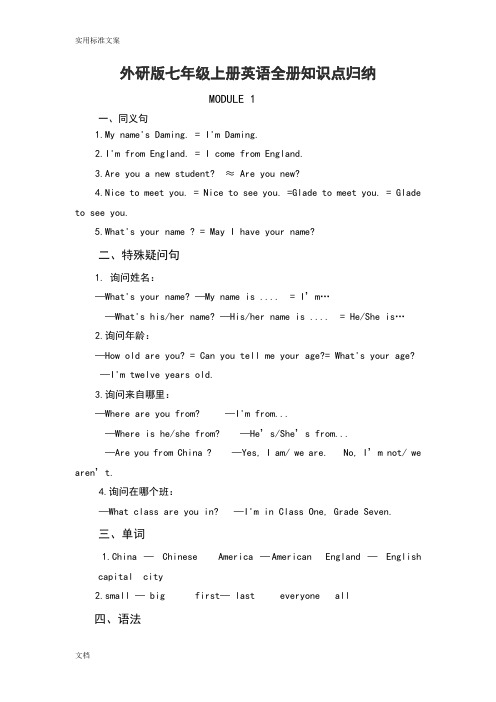
外研版七年级上册英语全册知识点归纳MODULE 1一、同义句1.My name's Daming. = I'm Daming.2.I'm from England. = I come from England.3.Are you a new student? ≈ Are you new?4.Nice to meet you. = Nice to see you. =Glade to meet you. = Glade to see you.5.What's your name ? = May I have your name?二、特殊疑问句1. 询问姓名:—What's your name? —My name is .... = I’m…—What's his/her name? —His/her name is .... = He/She is…2.询问年龄:—How old are you? = Can you tell me your age?= What's your age?—I'm twelve years old.3.询问来自哪里:—Where are you from? —I'm from...—Where is he/she from? —He’s/She’s from...—Are you from China ? —Yes, I am/ we are. No, I’m not/ we aren’t.4.询问在哪个班:—What class are you in? —I'm in Class One, Grade Seven.三、单词1.China —Chinese America —American England —Englishcapital city2.small — big first— last everyone all四、语法1.代词人称代词主格 I you he she it we you they形容词性物主代词(…的) my your his her its our your their2.be动词:am I am= I’m I am not= I’m notis He /She is = He’s /She’s is not = isn’tare We /You /They are = We’re / You’re /They’re are not= aren’tMODULE 2一、单词grandparents grandfather—grandmother parents father—mother mum---dad daughter—son sister—brother aunt—uncle cousin husband---wife family woman---man women---men职业:job actor driver doctor manager nurse worker teacher policeman工作地点:factory hospital hotel office school theatre bus station shop二、短语a photo/picture of my family in front of in/at the frontof next toon the right --- on the left三、语法1.this---that these---those I---we he/she/it---they2.名词所有格:Miss Li's =her Tom’s = hisLily and Lucy's 两人共有的 eg: Lily and Lucy's desk is big Lily's and Lucy's 两人各有的Lily's and Lucy's desks are small.My parents’ room is very clean.四、句子1.---Is this your sister? --- Yes, it is. No, it isn’t---Are these her books? ---Yes, they are. No, they aren’t.2.---Who is this? --- This is my brother.--- Who are they/these? --- They are my cousins3. ---What’s your sister’s name?---My sister’s name is…/Her name is…4.---What does your father do?=What is your father's job?=What is your father?---He is a ...MODULE 3一、单词1.buildings: classroom, dining/sports hall, library, office, science lab, playground2.something: blackboard, book , room, computer, desk, furniture, map,wall,picture, television3.numbers: thirteen fourteen fifteen sixteen seventeen eighteen nineteenthirty forty fifty sixty seventy eighty ninety4.介词:next to ≈ near behind ≠ in front of in/at the front of:在......里面的前面in on under5. in the middle of on the left of--- on the right ofbetween …and… a map of our school6.right 正确的≠wrong右边的≠left二、句子1. Where is the office building ? It is between the dining hall and the library.2. How many students are there in your class? There are 38 students in my class.三、语法(There be)----Are there any school offices?----Yes, there are. There are some offices.----Is there a computer on Miss Li's desk?----No, there isn't.注意:1.就近原则:1). There is an orange and two apples on the desk.There are two apples and an orange on the desk.2). There are some students in the classroom.Are there any students in the classroom? Yes, there are. No, therearen’t3)There aren’t any students in the classroom.There isn’t an orange on the desk.MODULE 4一、family members:aunt uncle grandma grandmother grandpa grandfather mother father mum dad sister brother二、短语句型Thank you for your email.your help.helping me.asking me.inviting me.Make a family tree for your family.----How many people are there in your family?----There are four. There are my mum and dad, my sister and me.----Have you got an aunt?/any .....?----Yes,I have./No,I haven't.----Have you got a small family or a big family?----I've got a big family.or的用法:①或; (选择疑问句)②并列否定:I don't like swimming or dancing.MODULE 5-6一、单词1. orange 橙汁 have some orange [U]橙色 the oranges are orange [C]橙子 This is an orange [C]2.kind 善良 He is very kind.种类=tyre a kind / type of fruit two kinds /types of fruits3. gym: 不受天气影响的室内体育馆、健身房或运动馆stadium: 周围有看台的露天大型运动场4.healthy ≠ unhealthy keep/stay healthy保持健康in good health ≠ in poor/bad healthbe healthy = be in healthbe good for one’s health ≠be bad for one’s health名词变复数条件变化形式例词一般情况 + - s shops单词以s、x、ch、sh结尾 + - es buses以辅音字母+y结尾去y为i + -es city-cities单词以“o”结尾有生命+ - es tomatoes无生命 + - s zoos 一些以‘f’或‘fe’结尾的单词把’f‘或’fe‘变成’ves' knife-knives二、短语三、句型四、区别MODULE 7一、短语talk about sth.谈论某事talk to sb. 跟某人谈话(一方讲一方听)talk with sb. 跟某人谈话(双方都讲)get up≠go to bedgo home≠leave home(for)study science/history/chemistry/maths/...二、语法①时间表达法:What's the time? =What time it is?顺读法: It's two ten. 2:10 (直接读出数字)逆读法:①It's ten past two.(2:10) ≤30'②It's ten to ten. (2:50) >30'整点表达法:It's two o'clock. (2:00) 注意: (不用介词)②一般现在时(1)【No. 1】一般现在时的功能1.表示事物或人物的特征、状态。
初中英语知识点总结外研社

初中英语知识点总结外研社一、词汇与短语1. 基础词汇- 常见名词:家庭成员、学校科目、日常用品、颜色、数字、食物等。
- 动词:一般现在时、一般过去时、现在进行时的动词变化。
- 形容词和副词:描述人、物、地点的特征及其比较级和最高级形式。
- 代词:人称代词、物主代词、反身代词、指示代词、疑问代词等。
2. 短语搭配- 动词短语:look at, listen to, help with, play with等。
- 介词短语:in the morning, on the table, at school等。
- 常用表达:问候、感谢、道歉、请求、提供帮助等。
二、语法1. 时态- 一般现在时:表示经常发生的动作或状态。
- 现在进行时:表示正在进行的动作。
- 一般过去时:表示过去某一确定时间发生的动作或状态。
- 一般将来时:表示将来某一时间会发生的动作或状态。
2. 句型结构- 陈述句:表达事实或陈述性的句子。
- 疑问句:提出问题的句子,包括一般疑问句和特殊疑问句。
- 否定句:表达否定意义的句子。
- 祈使句:表示命令、请求或建议的句子。
3. 语态- 被动语态:表示句子的主语是动作的承受者。
4. 非谓语动词- 动名词:作为名词使用,可以作主语、宾语等。
- 分词:现在分词和过去分词,用作形容词或副词。
5. 从句- 宾语从句:作为句子宾语的从句。
- 定语从句:修饰名词或代词的从句,通常由关系代词引导。
- 状语从句:表示时间、原因、条件、结果等的从句。
三、阅读理解1. 阅读技巧- 快速阅读:通过略读抓住文章大意。
- 精读:仔细阅读,理解文章细节和深层含义。
- 寻找主题句:通常位于段落的开头,概括段落主要内容。
2. 阅读题型- 事实细节题:根据文章内容选择或判断正确的信息。
- 主旨大意题:确定文章或段落的中心思想。
- 推理判断题:根据文章内容进行逻辑推理,得出结论。
四、写作技巧1. 文章结构- 引言:介绍背景信息,引出文章主题。
外研版九年级英语知识点总结
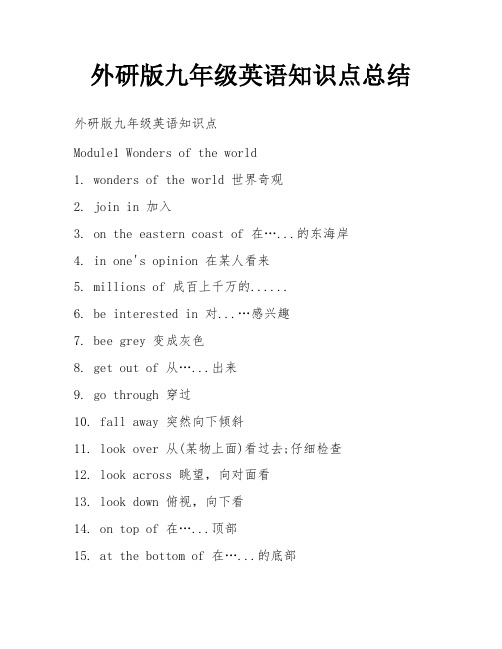
外研版九年级英语知识点总结外研版九年级英语知识点Module1 Wonders of the world1. wonders of the world 世界奇观2. join in 加入3. on the eastern coast of 在…...的东海岸4. in one's opinion 在某人看来5. millions of 成百上千万的......6. be interested in 对...…感兴趣7. bee grey 变成灰色8. get out of 从…...出来9. go through 穿过10. fall away 突然向下倾斜11. look over 从(某物上面)看过去;仔细检查12. look across 眺望,向对面看13. look down 俯视,向下看14. on top of 在…...顶部15. at the bottom of 在…...的底部16. on both sides 在两边17. look like 看起来像18. be famous for 因…...闻名19. do an interview 做采访20. draw a picture of 画一幅…...的图画21. go down 下去,下沉22. high up 在高处23. more than 超过24. dozens of 数十个,许多25. in height 高度,在高度上Module2 Public holidays1. as soon as 一…...就......2. take a vacation 度假3. have a picnic 野餐4. play music 演奏音乐5. go somewhere interesting 去有趣的地方6. make short speeches 做简短的演讲7. give thanks for 感谢......8. grow corn 种植玉米外研版九年级英语知识点梳理所谓垂悬结构(The Dangling Construction)就是一个句子成分,如分词短语,不定式动词短语等,找不到被修饰的主语或被修饰的对象不合逻辑。
外研版七年级下英语知识点总结

Unit1 Can you play the guitar?1.常见的情态动词:cancouldmaymightmust shall shouldwillwould等情态动词+动词原形,疑问句中情态动词提前,否定句在情态动词后加not。
2.Play+ the+乐器play the guitar. play the drums. play the piano. play the violin Play +球类.棋类.牌类游戏play volleyball. play chess.play cards.Play(games)with sb. 和某人一起玩(游戏)3.Join+组织或者人Join the art club join sb. Join in+竞赛.娱乐.游戏等Take part in+活动加入到某活动中Be in 参加.加入.穿着4. what club do you want to join?你想要参加什么俱乐部?The singing club唱歌俱乐部the drawing club 绘画俱乐部the dancing club舞蹈俱乐部the swimming club游泳俱乐部the story telling club 讲故事俱乐部The music /English /art/chess/sports club 音乐/英语/美术/象棋/运动俱乐部5. Pianist钢琴家violinist小提琴手singer歌手dancer舞蹈家musician音乐家6.Let sb do sth 让某人做某事Let’s+动词原形让我们做某事7.Say+内容say hello to sb. say sorry to sb. say to sb.Speak+语言speak English/Chinese/Japanese speak to sb.Talk 谈论talk about sth. talk with sb. talk to sb. talk show脱口秀Tell 告诉.讲述tell sb. sth= tell sth to sb.告诉某人某事tell sb. about sth 告诉某人关于某事tell sb. to do sth. 告诉某人去做某事tell sb. not to do sth 告诉某人不要去做某事tell stories/ jokes/lies讲故事/讲笑话/说谎Ask问.要求ask for 请求ask sb for sth 向某人索要某物ask about询问关于某事ask sb. about sth询问某人关于某事ask sb to do sth 要求某人去做某事ask sb not to do sth要求某人不要去做某事8.Want to do sth.= would like to do sth.=feel like doing sth.想要做某事Want sb. to do sth.= would like sb. to do sth.想要某人做某事Want to be+adj want to be + 职业9.What about =how about,后接名词,代词,动名词what about you你呢?what about the book这本书怎么样?what about dancing跳舞怎么样?10.也:too 肯定句末(前面加逗号)Either否定句末(前面加逗号)Also 实前助后As well 口语中(前面不加逗号)11.be good at+ sth/doing sth=do well in 擅长于…be good for 对…有益(be bad for对…有害)be good to 对…友好(good 可用friendly.nice.kind替换)be good with和…相处好=get on well with= get along well with12.感官动词(look. sound. taste. smell. feel)+ adj做表语13.选择疑问句用or来连接选择部分.回答不用Yes或No.要从中选择一个回答14.students wanted for school show(wanted表示招募.含有被动意义)15.show sth to sb=show sb sth让某人看某物the school show 学校演出give sth to sb=give sb sth给某人某物16.help sb do sth Help sb with sth helpful有帮助的With one’s help= with the help of sb在某人的帮助下Help oneself to 随便享用can't help doing sth.情不自禁做某事17.be busy doing sth忙于做某事be busy with sth忙于某事18.need to do sth need sb to do sth need….for…19.be free to do sth= have time to do sth有时间去做某事Have no time= don’t have time=be busy 没有时间20.make friends with sb 和某人交朋友make money 赚钱make a living 谋生make faces做鬼脸make fun of sb取笑某人21.call sb. at +电话号码call sb. back 给某人回电话22.on the weekend= on weekends23. English-speaking students说英语的学生(English-speaking有连词符,是形容词)24.do kung fu练功夫The old people’s home老人之家the Students’Sports Center25.It is +adj +for sb to do sth做某事对于某人是...形容词修饰名词.副词修饰动词或者形容词26.teach sb sth教某人…. Teach me Chinese teach him MathTeach sb to do sth 教某人去做某事Learn to do sth 学习做某事learn from sb./sth向某人学习、从某事中学习27. Write down写下write to sb =write a letter to sb.给某人写信write back to sb 给某人回信hear from sb 收到某人的来信At least至少make a poster制作海报28.定冠词the的用法(1)特指某(些)人或某(些)物,这是定冠词的基本用法。
(完整版)初中英语外研版教材目录与知识点
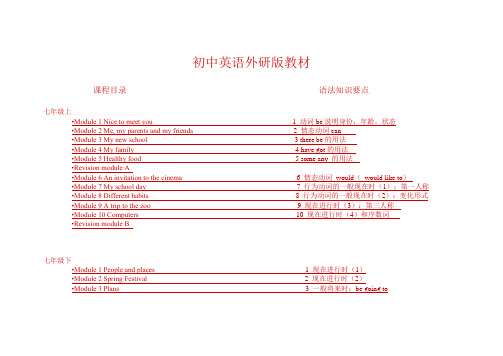
•Module 11 National heroes11一般过去式:特殊疑问句形式
•Module 12 A holiday journey12一般过去式:不规则变化的动词
•Revision module B
八年级上
•Module 8 Different habits8行为动词的一般现在时(2):变化形式
•Module 9 A trip to the zoo9现在进行时(3):第三人称
•Module 10 Computers10现在进行时(4)和序数词
•Revision module B
七年级下
•Module 1 People and places1现在进行时(1)
•Module 2 Education2代词
•Module 3 Now and then3形容词与副词
•Module 4 The way we look4介词与介词短语
•Module 5 Rules and suggestions5情态动词
•Revison A
•Module 6 Look after yourself6时态
•Module 10 My perfect holiday10 would与状语从句(3):让步状语从句
九年级上
•Module 1 Wonders of the world1六种时态的复习
•Module 2 Great books2一般现在时的被动语态
•Module 3 Sporting life3一般过去时和一般将来时被动
•Module 6 The Olympic adventure6形容词比较级和副词
(完整版)初中英语外研版教材目录与知识点,推荐文档
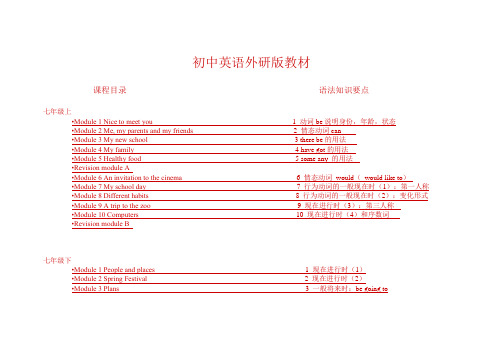
•Revision module A
•Module 6 An invitation to the cinema6情态动词would(would like to)
•Module 7 My school day7行为动词的一般现在时(1):第一人称
•Module 6 The Olympic adventure6形容词比较级和副词
•Revision module A
•Module 7 Planes, boats and trains7形容词和副词的最高级
•Module 8 My past life8一般过去式:be动词
•Module 9 Story time9一般过去式:实意动词的变化形式
•Module 4 Great inventions4现在完成和情态动词的被动
•Module 5 Museums5合成词构成法
•Module 6 Save our world6前缀,后缀构词法
•Revision module A
•Module 7 Australia7 that引导的定语从句
•Module 8 Photos8 which who引导的定语从句
•Module 10 Lao She''s Teahouse10动词不定式和双宾语
•Module 11 The weather11情态动词may/might动词不定式做主语
•Module 12 Traditional life12情态动词must, can
•Revision module B
八年级下
•Module 10 Life history10一般过去式:行为动词,疑问,否定形式
- 1、下载文档前请自行甄别文档内容的完整性,平台不提供额外的编辑、内容补充、找答案等附加服务。
- 2、"仅部分预览"的文档,不可在线预览部分如存在完整性等问题,可反馈申请退款(可完整预览的文档不适用该条件!)。
- 3、如文档侵犯您的权益,请联系客服反馈,我们会尽快为您处理(人工客服工作时间:9:00-18:30)。
文档来源为:从网络收集整理.word 版本可编辑.欢迎下载支持.外研社英语七年级上册英语知识点 MODULE 1 一、同义句1.My name's Daming. = I'm Daming.2.I'm from England. = I come from England.3.Are you a new student ?≈ Are you new?4.Nice to meet you. = Nice to see you. =Glade to meet you. = Glade to see you.5.What's your name ?= May I have your name ?二、特殊疑问句 —What's your name ? —How old are you? = Can you tell me your age?—My name is ....= What's your age?—I'm twelve years old.—Where are you from? —What class are you in?—I'm from... —I'm in Class One, Grade One.三、单词短语1.practise + ding sth.2.with &and A and B go to the bank.A withB goes to the bank.四、形容性物主代词I--my you--your he--his she--her it--itswe--our you--your they —them 重难点:1. My name's Daming. = I'm Daming.2. I'm from England. = I come from England.3. Are you a new student ?≈ Are you new?4. Nice to meet you. = Nice to see you. =Glade to meet you. = Glade to see you.5. What's your name ?= May I have your name ?6.with &and A and B go to the bank.A withB goes to the bank.7. I--my you--your he--his she--her it--itswe--our you--your they —them MODULE 2一、单词职业:doctor manager secretary worker teacher工作地点:factory hospital hotel office school university四、句子What does your ... do?=What is\are you ...'s job?=What is your ...?He\She is a ... They're ... 重难点:1. play 与不同的名词搭配时所表达的意思是不同的,play 与球类搭配时是不需要加定冠词the ,如:play football ,basketball ,volleyball and so on.Play 与乐器搭配时是需要加定冠词the ,如:play the piano ,the guitar and so on.2. 固定搭配:ride a bike/horse,speak English/Japanese/Chinese,sing a song,swim.3. 不定冠词a 与an 的用法4. 语法知识:Can 的用法 Can do sth Can+主语+do sth ? Yes ,主语+can./No ,主语+can ’t. I can ’t do sth.5. What does your ... do?=What is\are you ...'s job?=What is your ...?He\She is a ... They're ... MODULE 3一、单词1.buildings in school: classroom dining hall gym library office science lab2.something: blackboard book classroom computer desk dictionary football library picture television3.numbers: thirteen fourteen fifteen sixteen seventeen eighteen nineteen thirty forty fifty sixty seventy eighty ninety4.介词:next to ≈ near behind ≠ in front of in on under5.in front of:在......前面in the front of:在......里面的前面6.right 正确的≠wrong右边的≠left 二、语音er 、or 、ur 发/ə/三、语法(There be)----Are there any school offices?----Yes, there are. There are some offices. ----Is there a computer on Miss Li's desk? ----No, there isn't.注意:1.就近原则:There is some meat and two apple on the desk.2.名词所有格:Miss Li's herLily and Lucy's 两人共有的 eg: Lily and Lucy's father.Lily's and Lucy's 两人各有的 Lily's and Lucy's fathers. 重难点:1.重要单词: classroom dining hall gym library office science lab blackboard book classroomcomputer desk dictionary football library2.介词的用法: next to ≈ near behind ≠ in front of in on under3.in front of 与 in the front of 的区别4.语法知识: ----Are there any school offices?----Yes, there are. There are some offices. ----Is there a computer on Miss Li's desk? ----No, there isn't.就近原则:5.名词所有格: MODULE 4一、family members:aunt uncle grandma grandmother grandpa grandfather mother father mum dad sister brother二、短语句型Thank you for your email. your help. helping me. asking me. inviting me. Make a family tree for your family.----There are four. There are my mum and dad, my sister and me.----Have you got an aunt?/any .....?----Yes,I have./No,I haven't.选择疑问句)or 的用法:① 或; ② 并列否定:I don't like swimming or dancing. :1.重要单词: aunt uncle grandma grandmother grandpa grandfather mother father mum dad sister brother2.重要短语:Thank you for doing sth./Thanks for doing sth.3.have got 的用法4.重难点: or 的用法:① 或; ② 并列否定:I don't like swimming or dancing. MODULE 5-6一、单词1. orange 橙汁 have some orange [U ]橙色 the oranges are orange [C ]橙子 This is an orange [C ]2.Kind 善良 He is very kind.种类=type a kind / type of fruit two kinds /types of fruitsusually 、always 、often 、never + n. be + usually 、always 、often 、never3.表示客观现实。
eg :The earth goes around the sun.【No. 2】一般现在时的构成1. be 动词:主语+be(am,is,are)+其它。
eg :I am a boy.2.行为动词:主语+行为动词(+其它)。
eg :We study English.【No. 3】否定句1. be 动词的变化:主语+ be + not +其它。
eg :He is not a worker.2.行为动词的变化:主语+ don't( doesn't ) +V 原形(+其它)。
eg :I don't like bread. 重难点:1. 重要短语:talk aboutsth/talk with sb/talk to sb.2. 时间的表达(直读法与逆读法)3. 一般现在时的概念与用法1(详见知识点总结) MODULE 8一、短语句型be different from ask sb. (not) to do sth. have a habit of ding sth.get sth. from sb. by her favourite singers a box of candies/chocolateson television wear silk shirts send/give sth. to sb. 【No. 1③频度副词用法重难点: 1. 重要短语 2. 一般现在时的概念与用法2(详见知识点总结)3. 形容词性物主代词的用法 MODULE 9一、单词① Names of the animalscamel elephant giraffe kangaroo monkey--monkeysSnake panda lion zebra polar bear wolf--wolvesAsia Africa Europe Oceania America North/South AmericaAsian African European Oceania Americain the desert / forest / grassland / jungle / sea / wild the Arctic+动词原形+其它。
